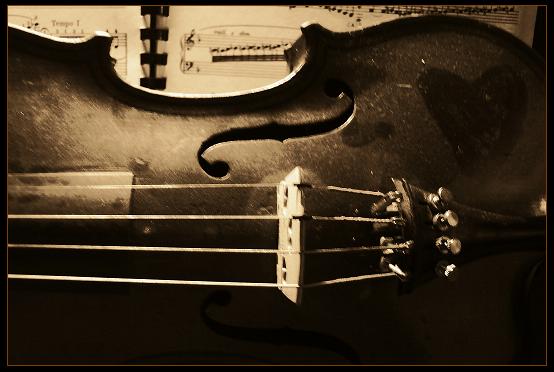There is a poem that tells of the auction on an old violin. As the auctioneer presents the violin to his audience, they see a dusty and worn violin in poor shape.
The auctioneer calls out, “One dollar, one dollar, Do I hear two?”
“Two dollars, who makes it three?”
“Three dollars once, three dollars twice, going for three,”
As the auction is about to close with a winning bid of three dollars, an older gentleman comes up from the back of the room.
“Then wiping the dust from the old violin
And tightening up the strings,
He played a melody, pure and sweet
As sweet as the angel sings.”“The music ceased and the auctioneer
With a voice that was quiet and low,
Said “What now am I bid for this old violin?”
As he held it aloft with its’ bow.“One thousand, one thousand, Do I hear two?”
Two thousand, Who makes it three?”
“Three thousand once, three thousand twice,
Going and gone”, said he.”The audience cheered,
But some of them cried,
“We just don’t understand.”
“What changed its’ worth?”
Swift came the reply.
“The Touch of the Masters Hand.”
Even without including the metaphorical explanation included in the poem, it is easily apparent that the Master makes us and our broken lives better with His touch. He takes us out of our out of tune lives and brings out the harmony and beauty within us.
But what if there’s more to it than that? What if there is a deeper and more powerful lesson that can be learned and applied in how we treat each other as individuals of worth?
Each time I reflect on this poem I come back to how the Master does little other than cleans and tunes what is already there.
The Master brings out the beauty that each of us possess by being a son or daughter of Heavenly Parents who made us in their image and loves us just the way we are.
He’s not trying to make us into a grander or finer instrument or give us a specific part in the orchestra. He is simply showing others that we are worth a lot more than what they may see.
The person you are, are becoming, and the things that make you beautiful are there the whole time. He takes us as we are and makes our imperfections a beautiful part of us. The Master didn’t replace the strings of the violin or get a better bow. He simply wiped off the surface, adjusted, and played the violin as it already was.
Each of us can be like The Master as we come to accept and love each person we meet as they are, knowing that Christ would do the same.
As I’ve contemplated the reactions from friends and family to those who are experiencing a faith transition and have decided to leave the church either in whole or in part, I hope that we can take a step back and try to become more Christlike by seeing the beauty that already exists in that person.
So often in the church, along with in many other religions, the scene as to what perfection looks like is already painted for us. Through decades of conference talks and Ensign articles, we get a very general and yet oddly specific picture of what a disciple of Christ should look like or act. When we see someone, all we see is the dust and all we hear is an ill tune that is not *quite* what it “should” be.
But that is not what Christ sees. He wipes and tunes the violin simply to get others to see the inherent worth in each of us. He would have taken the dusty and out of tune violin and loved it just the way it was.
These people we love are the same violin with or without dust. Their life experiences and personal feelings are tuning them so that they can play their own beautiful song. It may not be your favorite song, but it will be beautiful to them and beautiful to The Master and Creators.
I hope that we can all look for the amazing qualities that a person possess even when those qualities are accompanied by ones we don’t feel are as desirable.
And when that dusty out of tune violin comes up at auction, remember that even though from our perspective we see that as an imperfection, it does not make them any less valuable.
The Master comes,
And the foolish crowd never can quite understand,
The worth of a soul and the change that is wrought
By the Touch of the Masters’ Hand.





Excellent post Carrie. We were born great. We just need polishing.
Absolutely beautiful and relevant cuz.
Thank you, Carrie. Your analysis of the metaphor in this poem is inspiring.
Thanks for this. I use to have a video that narrates this poem with scenes to tell the story. I loved watching that. I especially like the second part when it relates it to people who have been discarded. It’s a great message. It also is similar to a book I loved as a child, The Bronze Bow. The ending of that story is like this poem.
I really needed to read this today. What an insightful analysis of the story. I guess this is my own personal call to be less judgmental of those who are critical of my Faith. Not only do we all have our own unique inherent beauty, but we’re also brothers and sisters in Christ. Than you for this.